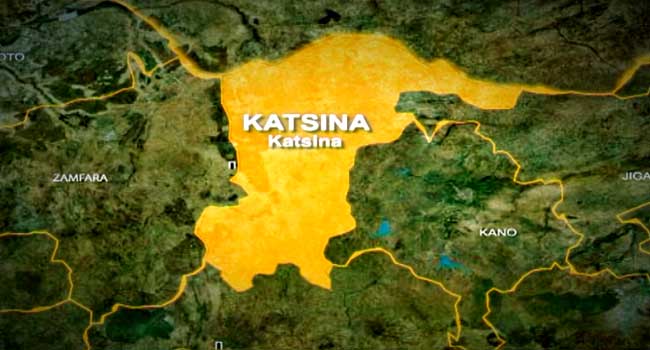By Our Reporter,The Nation
Copyright thenationonlineng

We strongly oppose negotiations with bandits
Residents of communities in Jibia council area of Katsina State were recently reported celebrating a peace accord with bandits who used to terrorise their neighbourhoods. They said relative calm had reigned in the area since the pact was sealed, and that the outlaws now offer protection to residents from attacks by external bandits not involved in the peace deal.
For them, the peace pact is a solution to the challenge of insecurity that wracked the area.
Jibia is a community cluster that borders Niger Republic, and was among areas embattled by terror exploits of bandits that hindered residents from farming, their children going to school and other routine business activities. Following a recent peace accord with bandits, however, hundreds of Internally Displaced Persons (IDPs) were said to have returned to their ancestral homes.
Agency reports cited a resident of Magama community applauding the relative peace that has returned to the area. The resident, Abubakar Mohammad, recalled that since a peace agreement was struck with bandits about six months ago, there has been no record of attacks on communities across the area. “Most of these bandits, we know them, we stay in the same area with some of them, some were even our friends before they decided to isolate themselves. But we thank God, since they have decided to embrace peace on their own. Some of them now come to the market, but you will never see them carry guns,” he said.
“When you go to the forest, you will see them with their guns protecting us from external attacks, especially (bandits) from Zamfara and other local government areas yet to embrace dialogue,” Mohammad added, describing the present situation as allowing for bumper harvest because many residents have returned to their farms after having abandoned them for a long period owing to insecurity.
Another resident of the area, Uzairu Rabiu, was cited saying: “For the past five to six months, there’ve been no reports of attacks by bandits; therefore, we’re happy.”
Also speaking at a joint security committee meeting, the Secretary of Jibia People’s Forum, Zubairu Sani, said the peace deal was at the bandits’ request. He lauded Governor Dikko Radda for his commitment to the fight against insecurity.
Echoing similar sentiments, a stakeholder body known as the Northern Elders Progressive Group (NEPG) urged governors in the North-west to negotiate with bandits. The North-west coordinator of the group, Mallam Yusuf Abubakar, said the forum supported non-kinetic measures being championed by National Security Adviser Nuhu Ribadu and other stakeholders to restore peace.
“We are happy with the steps being taken so far. Travelling recently from Sokoto to Gusau, and from Funtua to Zaria, I observed a more peaceful atmosphere. Compared to what obtained before, there is improvement in security, in patrols and in the safety of commuters along that road,” he stated.
Read Also: Blackout in parts of Benin enters two weeks
Abubakar urged governors to embrace dialogue, arguing that it is a more effective option than repeated condolence visits and military operations that overstretch security forces. “It is better for a governor to spend resources on saving lives than spending billions on condolence,” he said.
Replying to opponents of negotiations with bandits, Abubakar argued that dialogue worked in other conflict zones of the world: “Even powerful nations have negotiated with groups like the Taliban, Al-Qaeda, and the Houthis. Negotiation is not weakness, it is about saving lives.”
We differ from the selling points canvassed by advocates of negotiation with bandits. Beginning with the global argument, today’s Afghanistan and the costs of the Taliban’s ascendancy in power is the best you could hope for when you negotiate with terror groups. Neither has our own national experience justified negotiations with bandits as long-term harbinger of peace.
Ask former Katsina State Governor Aminu Masari. Late in 2021, he said with the benefit of hindsight, his government should never have negotiated with bandits. Masari, who had offered bandits amnesty after negotiating with them, said looking back, he never should have done that.
“We realised: who are you talking with, because they do not have an umbrella? They are not pushing any ideological view (or) religious view. They are simply bandits – criminals and thieves. Any person in the forest is a potential criminal and should be dealt with as such,” he stated.
On another occasion, he said the only basis for government to negotiate with bandits is if they surrender: “We are no more going to negotiate with them. But if, on their volition, they decide to renounce their violent criminal ways and embrace peace, we are ready to listen to them. Even then, they must surrender all the arms and ammunition in their possession, otherwise they remain enemies to be dealt with accordingly as far as we are concerned.”
Masari’s iterations captured the reality of dialogue with bandits. Any peace that results is usually ephemeral, because the outlaws use the breather from military action to regroup and reinvigorate. Dialogue can only be meaningful if it is to debrief bandits who surrender and are genuinely remorseful. That doesn’t seem to be the case in Jibia where the bandits reportedly arrogate themselves the task of keeping guard against bandits from without.
Non-kinetic option is doubtless helpful in the overall anti-terror war strategy. But this should be by way of winning over bandit-informants and debriefing surrendered bandits. Negotiating for peace at parity level is backing up the wrong horse.



